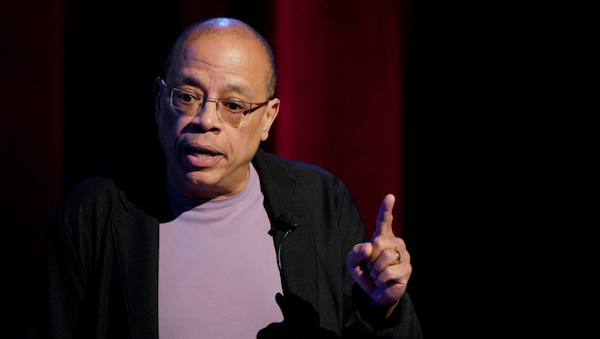Movie review by Greg Carlson
Directors Emily Kunstler and Sarah Kunstler, daughters of storied attorneys William Kunstler and Margaret Ratner, blend creative visual storytelling with keen legal and historical acumen to transform Jeffery Robinson’s potent stage lecture into one of the most vital documentaries of the year. “Who We Are: A Chronicle of Racism in America” uses a recording of Robinson’s 2018 presentation at Town Hall in New York as the basis for a sobering examination of the pervasive and insidious proliferation of institutionalized, race-based, anti-Black discrimination and oppression in the United States. It is exactly the kind of information so many politicians serving the Trump-influenced GOP fear will be taught in school.
Harvard-educated Robinson, the executive director of the Who We Are Project, was previously an ACLU deputy legal director and the director of the ACLU Trone Center for Justice and Equality, which houses the organization’s work on criminal justice, racial justice, and reform issues. He developed and refined his talk over the course of a decade, and the Kunstlers – who approached Robinson about imagining the piece as a documentary film – earned trust by, in Robinson’s words, “their clear commitment to engage in anti-racist self-reflection and action.” The filmmakers also guaranteed Robinson’s ownership of all rights to the movie as well as final editorial control.
Robinson’s stage version of “Who We Are” incorporates Power Point-style slides, graphics, video clips, and limited animation, “showing the receipts” for the many underreported realities linking America’s foundational reliance on the labor of enslaved people to the building of the nation. Even the very well-educated will gain fresh and eye-opening insights related to a wide-ranging number of topics. The hidden-in-plain-sight sentiment of slaveholder Francis Scott Key’s third verse to the Star-Spangled Banner, for example, is but one talking point: “No refuge could save the hireling and slave/From the terror of flight, or the gloom of the grave.”
And even though we don’t hear Run the Jewels performing “JU$T” on the soundtrack, Robinson reminds us that before Andrew Jackson brought enslaved servants to the White House when he became the president, he offered “ten dollars extra, for every hundred lashes any person will give him, to the amount of three hundred” in an ad seeking the capture of his runaway “property.” Twelve presidents of the United States owned people. Along the way, Robinson also addresses the 1921 “Black Wall Street” massacre in Tulsa, the practice of red-lining, the horror of lynchings, the assassination of Martin Luther King Jr. and the murders of black and brown people at the hands of police officers (then and now).
Like Ibram X. Kendi’s essential 2016 book “Stamped from the Beginning: The Definitive History of Racist Ideas in America,” Robinson’s thesis may at first feel overwhelmingly bleak and acutely painful, but it nevertheless conveys hope, promise, and possibility – if we are willing to put in the work. Some of the most effective scenes in the film version are the personal stories the Kunstlers persuaded an initially reluctant Robinson to include. And each time we cut away from the auditorium to Robinson interacting with folks – some friends, some strangers – “Who We Are” enters a dimension in which the author’s observations are transformed into the recognizably familiar and the intensely human.
